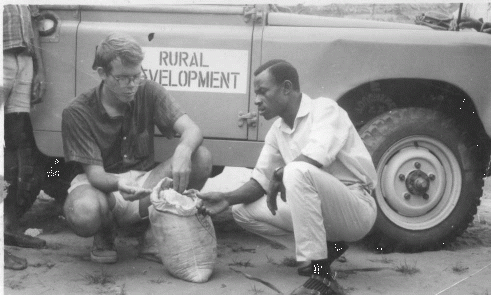Rice Demonstration Project
From Rpcvdraft
Story 2 - Mbiabong Mbat-Ekoi Atan Ubom Rice Demonstration Project My most troublesome project, little did I know it was worth the effort.
Contents |
Introduction
This was a rice demonstration project run by the Ministry of Agriculture (MOA), part was in INI County Council, Ikot Ekpene Division, Annang Province. It used land that belonged to 2 villages, each village was in a difference Province. I was asked to settle disputes between the villages and the villages and MOA that regarded the project.
Just prior to my arrival, day laborers at the site were chased off by a group of unhappy people with light weapons. A worker was shot it the rear end with an arrow. MOA employed 40 to 60 people, was constructing a large bund (levee) and had created 30 acres of rice paddies in a former swamp. Rice had not been grown in this region before. Frankly, I had to be talked into involving myself in what was clearly a volatile land dispute.
The doing
Unlike the 12 oil palm community farms I worked with in Ikot Ekpene Division, this demonstration project was "high maintenance". It required constant attention to the social and economic divisions of resources between the parties. Every small issue I had dealt with in the community farms and other projects, repeated themselves in this demonstration project. Fortunately, I had the full support of both Provinces, and the Ministry of Agriculture at the highest levels, including Enugu.
There are lots of stories in my mind about this project. Being asked to remove juju from part of the project (but not doing it but having it done), dividing land with 40 unhappy men waving machetes in the air as I crossed into a disputed section, contrasting the leader of each village (an okuku and a politician), realizing the MOA had not come close to splitting the workers hired from each village, nor housed their staff equally between the villages, not to mention some exciting trips in my Land Rover.
Biafra and beyond
The big story was what happened between the time I was evacuated in 1967 and my visit to Ikot Ekpene in 1972. The divisional office had just reopened within the month when I introduced myself and asked after 'my village projects'. "We remember what you did. It was the rice project that was the most important in the time of Biafra." The roughly 100 acres of rice turned into over 1000 acres at that site and another site had another 600 acres growing. As sort of an after thought, I was told that 8 of the 12 community farms were still being kept up without any government supervision.
Still amazes me, what a special time in Ikot Ekpene was for me and evidently how Peace Corps Volunteers had some kind of positive impact upon on the daily lives of people in Nigeria. By contrast, my time in Somalia was completely different.
--Rcollman 10:49, 2 November 2007 (EST)
Post script
I got a chuckle out of this when I did a Google search "rice Akwa Ibom mbiabet". Looks like Ambassador Sam Edem on Oct 17, 2007 made an announcement about a new rice mill. Then a few days later on 25 October, 2007 it was reported: "Chairman of the Niger Delta Development Commission, NDDC, Amb. Sam Edem has said that the commission embarked on commercial rice farming in order to not only provide huge employment for rural dwellers, but also save the country of over $1.2 billion it spends on rice importation annually.
Speaking during a fence-mending meeting with leaders, youths and people of Mbiabet community, Akwa Ibom State, over the misunderstanding that followed the proposed relocation of the NDDC Rice processing factory to Ibiaku Ntok Okpo, a border community in Ikono Council Area urged the communities to see the project as belonging to all no matter where it is situated.
Edem who brought to bear his diplomatic skill in handling the volatile situation, appealed to the parties in the dispute to bury the hatchet and work together to gain the full benefit the project will bring to the people and community.
Describing the Rice Mill as a catalyst that will fast- track the development in the region, while assuring the host communities of the multiple benefits the locals stand to reap from the sitting of the rice project in the area.
“This project is a catalyst because it will create the pace to transform the economic landscape of this community, the Local Government and the state as a whole,” he assured. Also speaking at the occasion, the consultant handling the project, Chief Felix Idiga said but for the problem in the communities, arrangements had been concluded with the foreign technical partner to start the bagging process of the rice project.
“We believe we will start processing the rice within a short period. As of now, we have a lot of rice grains packed in the warehouse ready for processing and bagging.” He expressed optimism that the project will not only benefit the immediate communities, but the country as a whole, adding that with adequate funding, in the next five years, Nigeria may not need to import rice.”
Setting the tone for the immediate return of peace to the community, the paramount ruler of Mbiabet community, Obong Etim Akpan Edward, said he would not trade peace with anything whatsoever, noting that it is only in an atmosphere of peace that development can thrive. The Chairman of Ini Local Government Area, Hon. Ibeto Ibeto, who pledged full support for the siting of the rice project at Mbiabet Ikpe, said the “factory was back to the community to stay.”
- Interesting. Exactly what was happening when this project started when it was only 30 acres. "The government" moved the hard assets away from this same village. An earlier announcement a month before said a mill would be put at "A'Ibom". Note the caption on the picture above.

